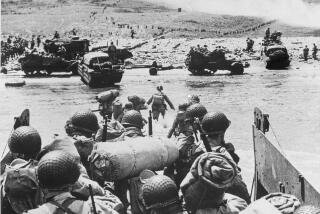The Day It Was Almost Over for Yogi Berra
- Share via
On the morning of June 6, 1944, the waiting was over for Yogi Berra; it was time to go. He’d waited on June 4 and all through the night of June 5. It was his D-Day, too.
He was then Lawrence Berra, 19 years old, Seaman 1st Class, U.S. Navy, and he was tossing and turning and waiting in the chop of the English Channel off the Normandy coast. Off Omaha Beach.
He’d set out on the Coast Guard transport Bayfield from Plymouth, England, early June 4 with history’s largest amphibious landing and waited for the weather to settle. For nearly three weeks he’d essentially been confined to base. “We didn’t know when we were going to go out,” Berra recalled later. “They didn’t tell us anything.”
So many of the men who endured that day and survived look back on it as the most significant moment of their lives. Berra nodded his agreement. “I’d have to say I was involved,” he said.
I was browsing a book of World War II history during the time Berra was managing for George Steinbrenner. I came across this mention of Berra on the Bayfield. Steinbrenner’s bluster did not frighten him. “Being there at Omaha may have changed my life a little,” Berra said.
There was some question of how frightened he was even then. Berra was on the Bayfield, the Coast Guard flagship, waiting to go over the side into a 36-foot LCSS, formally known as a landing craft support small. “We called it landing craft suicide squad,” Berra recalled. It was a wooden-hulled craft with steel plating topside. Six sailors and an officer would clamber aboard and the Bayfield’s cranes would lower them into the Channel. There were eight LCSS on the big boat, each of them named PA 33 for the Bayfield.
“We went out to rendezvous for the landing on the 5th and we had to zig-zag out there until the next morning,” Berra said. “Then we went in with the first wave.”
He had just turned 19 and had been permitted to finish his minor-league season at Norfolk in 1943 before being called to active duty. As rough as the Channel was, Berra recalled that he hadn’t been seasick. “Was seasick one time,” he said. That was going from Bayonne to Boston and it was smooth as glass, but Berra, the kid from St. Louis, had never been on the water before.
Berra’s job was manning a battery of twin 50-caliber machine guns and loading for a rocket launcher. They were supposed to sit 300 yards off the beach to lend fire support for the landing and anti-aircraft fire, and to pick up downed fliers. But first the big ships bombarded the beach, shells flashing over the heads of Berra and shipmates. “Like the Fourth of July,” Berra said. “It was loud.”
He recalled that there wasn’t much for him to do that day. Instead of keeping below the armor plating with shot and shell whizzing all around, Berra -- being Berra -- watched. “The officer told me, ‘Better get your damn head down,’ ” Berra said. “I wanted to watch. I wasn’t scared; I don’t know why. For some reason I wasn’t. It was amazing to see all those ships there.”
He recalled that his craft drew very little fire from the Germans on the beach or from the air. In supporting the landing, they were also to bring in downed German fliers for interrogation.
“Only guy we fished out, the only plane that came down in our sector, we shot down,” Berra said. “It was one of our guys.”
But the officer directing fire said: “That’s a German,” and Berra’s guncrew fired. “You did what you were ordered,” he said. “When we got there to him in the water, he was cursing like hell. I would have been angry, too. We fished him out and he’s yelling: ‘If you shot down as many of theirs as you shoot down of ours, the war would have been over long ago.’ ”
Berra spent two weeks off the beach on the LCSS shuttling messages between Omaha and Utah beaches and looking for magnetic mines the Germans may have dropped overnight.
Then they were lifted out of the sea and packed off to Bizerte in North Africa to prepare for another landing. That was in southern France in what came to be called the Champagne Campaign. “It was at some resort,” Berra said. “We stayed one day; it was an easy landing.”
It was there, Berra said, that he fired his machine guns at the enemy. “There was a machine-gun nest in a hotel,” he said. “We knocked it down. We could see two guys running out. We must have got something because it stopped firing.”
More to Read
Sign up for The Wild
We’ll help you find the best places to hike, bike and run, as well as the perfect silent spots for meditation and yoga.
You may occasionally receive promotional content from the Los Angeles Times.






